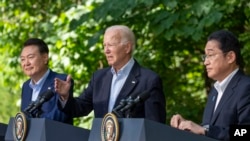The United States, South Korea and Japan have expanded their security cooperation beyond North Korea with their Indo-Pacific Dialogue, which one expert called a “significant” development aimed at deterring Beijing from escalating threats in the region.
The three countries held their first Indo-Pacific Dialogue last week in Washington, where they called out China by name and discussed its “dangerous and escalatory behavior” in the South China Sea.
They also opposed “any uniliteral attempts to change the status quo by force or coercion” in the Indo-Pacific and reaffirmed “the importance of peace and stability across the Taiwan Strait” in a statement issued after their meeting on January 5.
Gary Samore, who served as the White House coordinator for arms control and weapons of mass destruction during the Obama administration, said, “The U.S. would like this trilateral Indo-Pacific cooperation to be more than a response to North Korea” and “to also address potential threats from China.”
The three countries agreed to launch the Indo-Pacific Dialogue when they held their summit at Camp David in August. There, U.S. President Joe Biden, South Korean President Yoon Suk Yeol and Japanese Prime Minister Fumio Kishida issued a statement calling attention to China’s “aggressive behavior” in the region.
China’s maritime actions to assert sovereignty over almost the entire South China Sea have caused friction with Southeast Asian countries that reject Beijing’s claim. China also claims sovereignty over the self-governing island of Taiwan.
In East Asia, Chinese jets have been making dangerous incursions into the Korea Air Defense Identification Zone without identifying themselves.
Daniel Russel, who served as the assistant secretary of state for East Asian and Pacific affairs in the Obama administration, said, “Enhanced trilateral strategic and security cooperation has a substantial deterrent effect” and sends “an important signal to Beijing” that its “provocative behavior is driving ever closer unity among three immensely powerful nations.”
At a news briefing on Monday, Chinese Foreign Ministry spokesperson Mao Ning said Beijing “opposes a trilateral attempt to cobble together [an] exclusionary grouping” and “separatist moves toward ‘Taiwan independence.’”
The Chinese state-run Global Times paper published an article Sunday citing a Chinese expert as saying that Seoul and Tokyo have been wooed by the U.S. to recognize China as a “common adversary.”
The article continued that “the political and military alliance” among the three countries “will be further strengthened” so they can “contain China’s development” and “join the U.S. in collectively countering China.”
'Major milestone'
Before Seoul and Tokyo mended their frayed ties over historical differences rooted in the Japanese colonization of the Korean Peninsula in 1910-45, South Korea was mainly focused on deterring North Korean threats. Seoul was also reluctant to call out China as posing threats in the Indo-Pacific.
But since Yoon and Kishida mended their countries’ relations in March, which culminated in the trilateral summit in August, South Korea has been forthrightly joining the U.S. and Japan in countering China.
“The trilateral Indo-Pacific Dialogue was quite significant largely because it reflects a much closer alignment by Seoul in opposition to Chinese bullying beyond the Korean Peninsula,” Russel said.
He said it was “a major milestone” that Yoon had recognized South Korea’s security and its interests were “no longer confined to the Korean Peninsula.”
South Korea’s security and economy are at stake if conflict breaks out in the South China Sea, according to experts.
A report by Markus Garlauskas, director of the Indo-Pacific Security Initiative at the Atlantic Council, warns that if the U.S. is engaged in protracted conflict with China over Taiwan, Beijing could attempt to strike U.S. bases in South Korea. Biden has made pledges to defend Taiwan as well as the Philippines if China attacks.
Ryo Hinata-Yamaguchi, senior nonresident fellow at the Atlantic Council’s Indo-Pacific Security Initiative of the Scowcroft Center for Strategy and Security, said, “The Indo-Pacific region is critical for Seoul for both geopolitical and geoeconomics reasons, particularly given the interconnectiveness of the problems in the region that consequently affect the Korean Peninsula.”
He continued, “Moreover, the ROK’s [Republic of Korea] increasing capacity to deal with international security issues is also a big factor.”
Economically, conflict between China and Taiwan could slash South Korea’s GDP by 23.3%, according to Bloomberg Economics cited by Seoul-based magazine BusinessKorea.
Terence Roehrig, professor of national security affairs at the U.S. Naval War College, said, “The ROK economy is heavily dependent on trade and any disruption to maritime commerce would have a significant impact.”
More than 90% of South Korea’s trade volume passes through the Taiwan Strait and the South China Sea.





